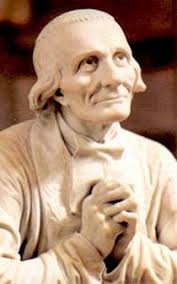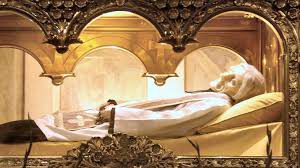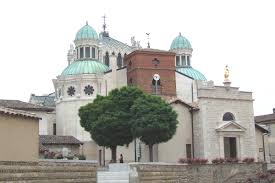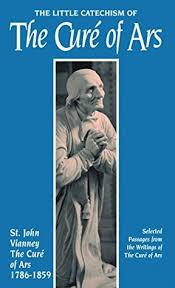 Some thirty years ago, I was touched by The Little Catechism of the Curé of Ars. The book contained select passages from the sermons and writings of one who had scraped through the seminary but ended up teaching even exalted churchmen. The book comprised his sage counsel on thirty-six important topics – Catholic wisdom stated in a simple, sublime, penetrating way.
Some thirty years ago, I was touched by The Little Catechism of the Curé of Ars. The book contained select passages from the sermons and writings of one who had scraped through the seminary but ended up teaching even exalted churchmen. The book comprised his sage counsel on thirty-six important topics – Catholic wisdom stated in a simple, sublime, penetrating way.
Amazing Life
I was simply curious to know about the life of this spinner of divine tales. He was none other than St Jean-Baptiste-Marie Vianney (1786-1859), a modest priest who transformed Ars, a non-descript parish in France, into a spiritual hub, thanks to his soothing confessions and zealous preaching.
Vianney was a born in a revolutionary age but spurned the revolution. In the face of the anticlerical sentiment of the Reign of Terror in France, he got to make his first communion and confession only at 11 years of age. Meanwhile, the heroism of the priests and nuns who had risked their lives for their faith impressed him. He felt a strong call that to pursue the priesthood but struggled with his theological studies. In 1815, he was finally ordained “though compassion”.
In 1818 he was appointed to Ars. The simple priesthood he exercised there, guided by prayer, fasting and penance, changed the village and infected the world with reports of his holiness. He was devoted to the Blessed Virgin Mary and to St Philomena. Most dedicated to the sacraments of the Holy Eucharist and Penance, he spent hours and hours before the Blessed Sacrament and in the confessional.
Always in awe of the priesthood, he said, “If I were to meet a priest and an angel, I would first greet the priest and then the angel… If there were no priest, the passion and death of Jesus would serve no purpose. What use is a treasure chest full of gold if there is no one who can unlock it? The priest has the key to the treasures of Heaven.”
By 1827 Ars had become a pilgrimage site, and, from 1845 until Vianney’s death in 1859, thousands from all stations of life visited that model parish to hear his preaching, make their confession, and be counselled by him. Pope Pius XI canonised him in 1925 and later declared him Patron of the Parish Priests. His body lies incorrupt and preserved in a glass coffin in the basilica of Ars.
Secret Hour
Somehow, I can’t help thinking of Chesterton’s “Donkey”. Prizing his unique encounter with Christ in Jerusalem, this beast of burden quietly thought of all those who despised him as mere “Fools! For I also had my hour, One far fierce hour and sweet…”
Likewise, Vianney had only his priesthood to offer and wouldn’t trade it for the world. He lived it intensely to the point that he became an alter Christus. The spirit of God was engraved in his heart. His faith was his knowledge, which he sought not in libraries or amidst the learned, but solely by falling on his knees in prayer.

Thereafter there was no stopping him. His prayer flowed through his preaching. They say it was difficult to listen to him and be unmoved, because he preached with his whole being – to packed pews yet to each heart, and as though scanning every secret history. He spoke colloquial French, sometimes grammatically incorrect, yet the congregation got a foretaste of heaven. Mingling with his discourses some happy reminiscences of his shepherd life, he borrowed his similes and metaphors from nature, from the beauties of the country and the emotions of rural life. No wonder, men and women living in a troubled world experienced the peace of God’s word.
But that was not all. A spiritual cure would never be complete without a heartfelt confession, for the Lord never spurns a humble, contrite heart. Here was a Curé, a contemplative who softened the austerity of his ideas through poetic images. His life was restricted to the little world of Ars but his reflections on topical issues touched those who came from far and wide seeking his help. The pastor’s thoughts were deep and sometimes startling enough to stop the penitent in his tracks. For instance, he called the cemetery the home of all; purgatory, the infirmary of the good God; and earth, a warehouse. And he said, very categorically, that a soul after confession requires tears to purify it.
What a fool!

I confess with nostalgia that it is in the Little Catechism of the Curé of Ars that I first encountered the term “infused science”. This refers to knowledge divinely conferred on human beings without previous experience or reflection. Or, according to Père Gratry, who is quoted in the preface: “There is no doubt that, through purity of heart, innocence, either preserved or recovered by virtue, faith, and religion, there are in man capabilities and resources of mind, of body, and of heart which most people would not suspect. To this order of resources belongs what theology calls infused science, the intellectual virtues which the Divine Word inspires into our minds when He dwells in us by faith and love.”
When I first read Vianney, it struck me that wise fools are they who are anointed by the Lord with an infused science that makes all things possible. In the words of St Paul, “We are fools for Christ’s sake, but you are wise in Christ.” (1 Cor 4: 10)